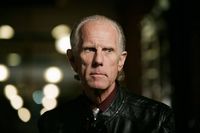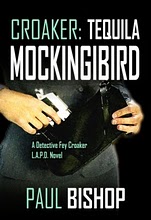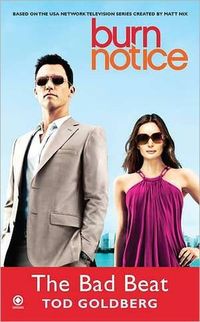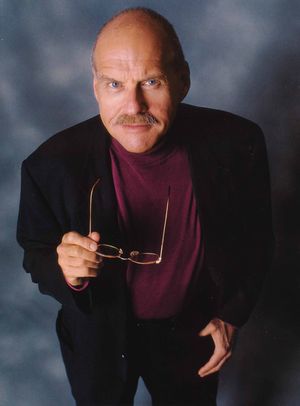 Today I’m honored (and thrilled) to feature a guest-post by author Lawrence Block…discussing, among other things, the perils of time on a series character like Matthew Scudder and how he approached writing his brilliant new novel A Drop of the Hard Stuff.
Today I’m honored (and thrilled) to feature a guest-post by author Lawrence Block…discussing, among other things, the perils of time on a series character like Matthew Scudder and how he approached writing his brilliant new novel A Drop of the Hard Stuff.
“The past is a foreign country: they do things differently there.” That’s the sentence Leslie Poles Hartley chose for the opening of his novel, The Go-Between, and if those eleven words were all he ever wrote, he’d still deserve a spot in any proper collection of quotations.
Isn’t it a gorgeous line? And it has the added advantage of being true.
My wife and I are fairly intrepid globetrotters, and members in good standing of the Travelers Century Club. We’ve crossed borders on ships and planes, buses and trains, and a few more on foot, but we haven’t yet tried a time machine.
As a fictioneer, I’ve kept myself rooted in the present. I love period fiction when it’s done right (Thomas Flanagan, Jeff and Michael Shaara, Max Byrd) but have never felt inclined to get into the game. I have my work cut out for me trying to make sense of the world around me, right here and right now.
On May 12, Mulholland Books published A Drop of the Hard Stuff, my 17th novel featuring Matthew Scudder. I’ve been writing about the man since the early seventies, and he’s now in his early seventies, and no longer able to leap tall buildings in a single bound. Which is my own damn fault, because I decided early on to have Scudder age in real time. I’ve never regretted it, because it’s made him more real for me and for readers as well, but this added realism brings with it an added sell-by date.
Now I may have to keep on working but why should he? The man’s got a rich wife and a pension from the city. And, considering all he’s been through, hasn’t he earned a comfortable retirement?
My wife’s bright and beautiful, but she never had Elaine’s opportunity to amass wealth. And all I get from the City of New York is a reduced-rate card for the subways and buses. I’m not complaining, mind you. . .
Still, the fact that I have to go on writing doesn’t mean I have to go on writing about Matt Scudder. But I was out for a walk one day, and it struck me that there was a gap of some seven years in Scudder’s story. (His fictional autobiography, you could call it, which I’ve been ghosting for him for the past quarter-century.) In Eight Million Ways to Die (1982), he leave a drink on the bar, goes to an AA meeting, and cops to his alcoholism. In Out on the Cutting Edge (1989) he’s seven years sober and living his life.
I didn’t skip this stretch of Scudder’s life because I figured it was uneventful. From what I’ve observed, early sobriety tends to be anything but. Thing is, I’d figured the series was done when he got sober, and it took me seven years to realize Matt and I weren’t through with each other.
Matter of fact, the book that followed Eight Million Ways to Die was a sort of prequel. When the Sacred Ginmill Closes (1986) recounts events ten years earlier, when Scudder’s world centered upon saloons and hotel rooms and after-hours joints. When it was published, it got an enthusiastic review from Richard F. Snow, the longtime editor of American Heritage; he justified it by proclaiming the book an historical novel, and the 1970s thus a part of the past.
I thought of that when I returned to Scudder’s past in A Drop of the Hard Stuff. I’d had a couple of other dips into past time in three Scudder short stories, “Looking for David,” “Let’s Get Lost,” and “A Moment of Wrong Thinking,” each consisting of today’s Scudder recounting events from his NYPD days. But this would be different. This would be total immersion, a full descent into that foreign country of past time. And, while it would be bookended by a late-night conversation between Matt and Mick Ballou, and would take place in 1982-3, it would reach back even further into the past—to his years on the police force, and his boyhood in the Bronx. 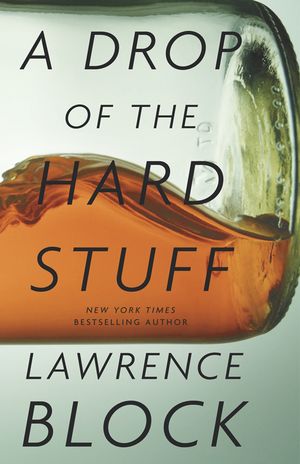
Well, you know, I make this stuff up, so it wasn’t as though I had to go interview people to find out what Scudder was up to back in the day. But I had to return in my own mind and memory to a very different world, a world without cell phones and personal computers, a world in which we somehow actually managed to find things out without Google or Wikipedia, and even managed to hook up without match.com or JDate.
If the past is a foreign country, its New York was certainly a very different city. Neighborhoods, now all squeaky-clean with gentrification, were mean streets indeed. You couldn’t walk a block without encountering a pay phone, but you might have to walk half a mile to find one in working order.
I didn’t get a computer myself until the early 90s, so in the interest of verisimilitude I suppose I could have forced myself to bang out A Drop of the Hard Stuff with a typewriter. But why? Did Jean Auel write Clan of the Cave Bear by scratching in the dirt with a sharpened stick?
I wrote the book my Mac, but the apartment I squatted in to write the book didn’t have wi-fi, so I was without Internet access during my working hours. While that didn’t exactly catapult me into the past, it made me realize just how much I rely on Google and Wikipedia (though not, I assure you, on match.com or JDate).
I didn’t do anything you could call research, having always been too lazy for that sort of thing, nor did I make a colossal effort to recall specifics. It seemed more natural simply to let myself slip into an earlier time when I was writing, rather as I slip into another voice or another state of mind or way of seeing the world. That, I suppose, is how fiction flows out of the imagination.
But I came away from the book with the perhaps obvious realization that the world has changed rather a lot in the years since Matt Scudder uncharacteristically left a drink unfinished and walked off to start a new life.
Barry Malzberg, my good friend and contemporary, had this to say about the book’s time period: “Completely different. 1982 is to the young Yuppie crowd today what 1900 was to us in the early sixties. Utterly historic. The Web and the social networks have not only changed, they have reformulated everything. We have survived to this world and it is a privilege and we can in fact handle it pretty well but I don’t kid myself: it might look like a bear and sound like a bear and shuffle like a bear but it isn’t.”
I think he’s got the proportions right: a 25-year descent into the past now, is the equivalent of a 60- or 70-year trip when we were young. The world moves faster, and the past recedes more rapidly with every passing year.
I can’t help thinking of “The Lightoliers,” a story of Stephen King’s. The eponymous entities were monsters, always at our heels, devouring the past. I don’t remember a thing about the story itself, but that one image lingers, perversely gaining in strength as the past falls away. The Lightoliers, forever chomping away, stealing all past time away from us.
Well now, isn’t that heavy baggage for a novel just designed to get you through a plane ride or a lonely night? But I won’t apologize. It’s the risk you run when you let a writer natter on about his work.
A very different place, the past. It’s hard to know what to pack, and you’d best have your passport in order. But a quick visit is not without its rewards.
And who’s to say? I might go back again. I can’t rule it out.
You can keep up with Lawrence Block and his musings on his blog, his Facebook page, his website, and on his Twitter feed: @LawrenceBlock
 It's going to be a long, hot Top Suspense Summer! Here 12 masters of the genre will keep you on the edge of your beach towel with 12 sizzling summer reads guaranteed to get your pulse pounding.
It's going to be a long, hot Top Suspense Summer! Here 12 masters of the genre will keep you on the edge of your beach towel with 12 sizzling summer reads guaranteed to get your pulse pounding.






